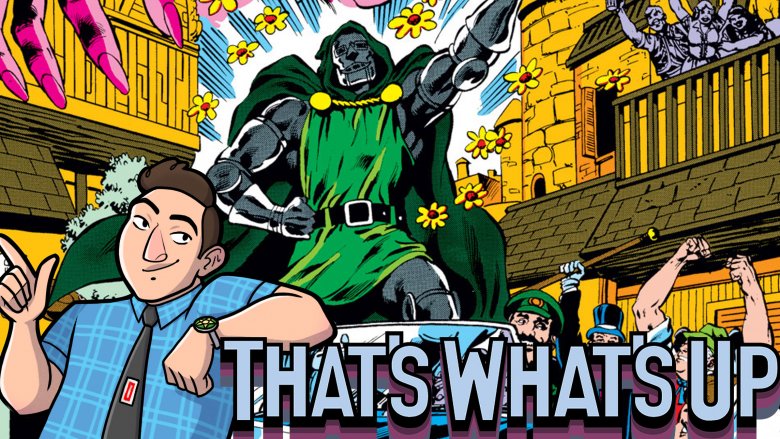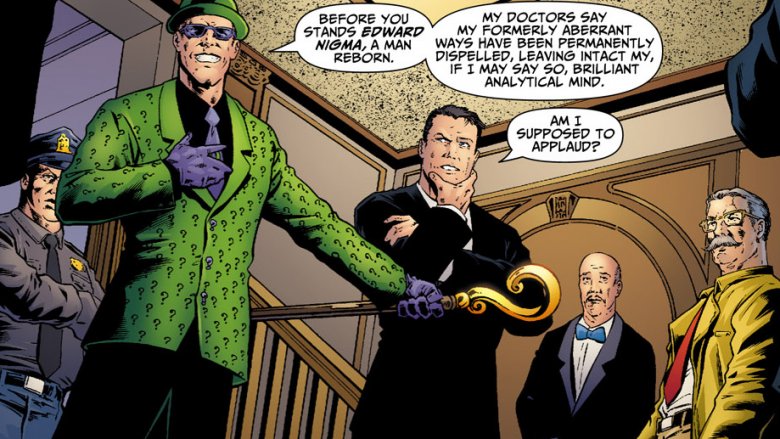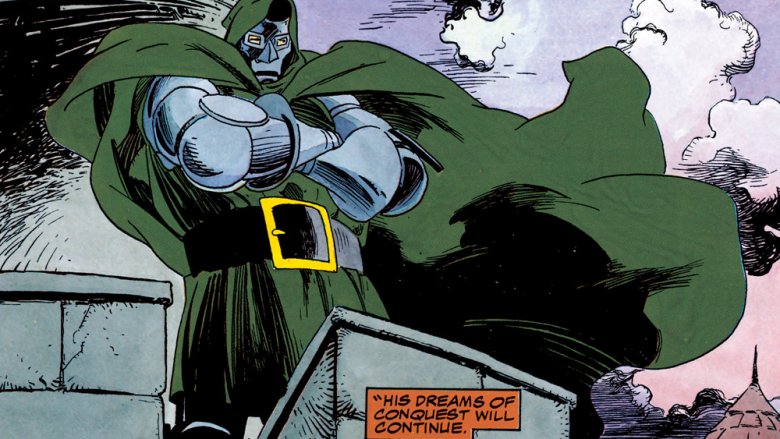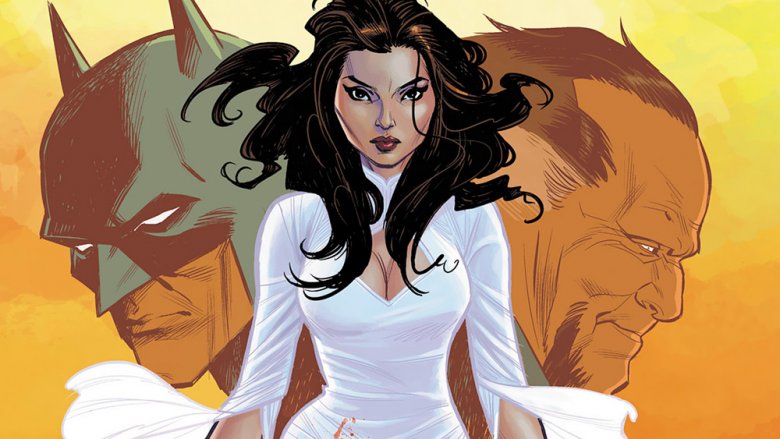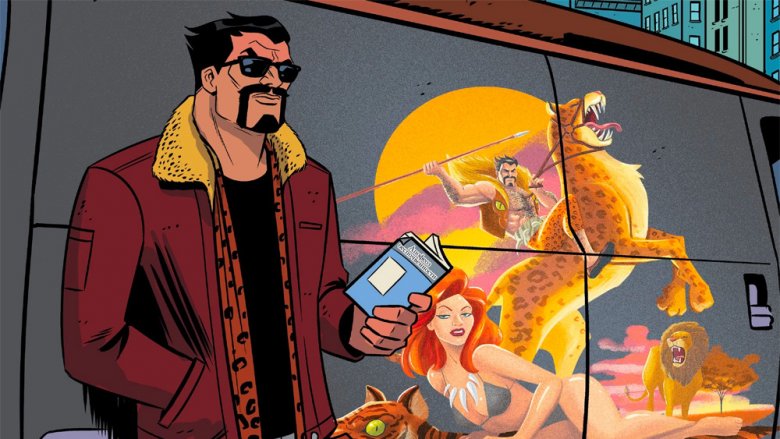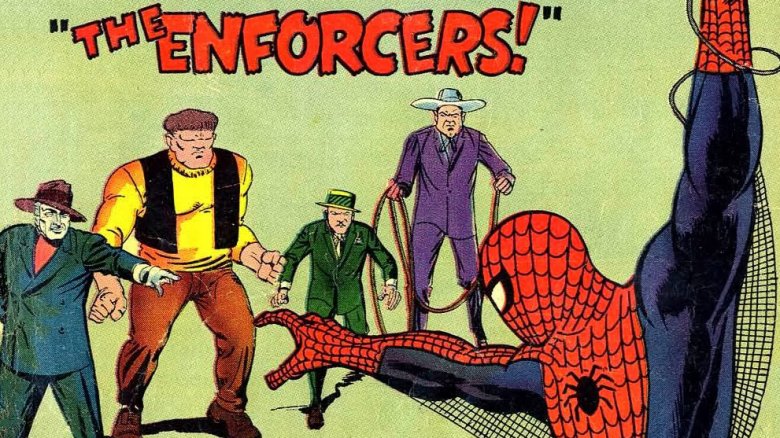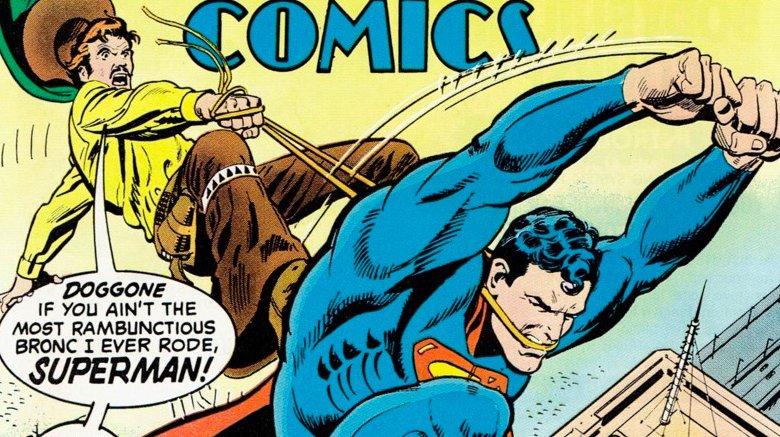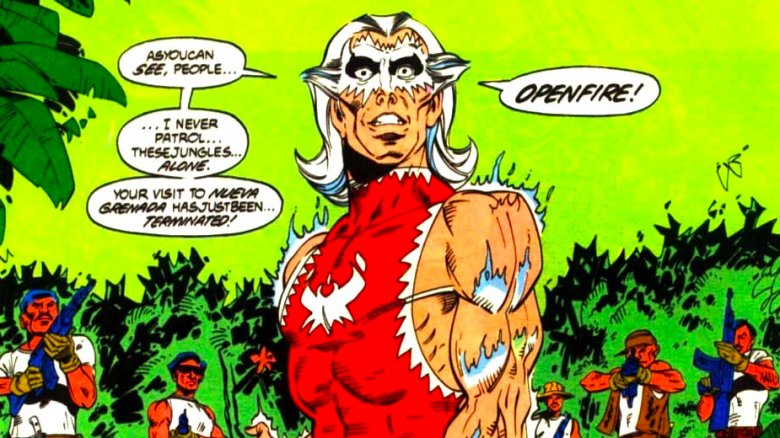That's What's Up: Supervillains Who Would Make Great Superheroes
Each week, comic book writer Chris Sims answers the burning questions you have about the world of comics and pop culture: what's up with that? If you'd like to ask Chris a question, please send it to @theisb on Twitter with the hashtag #WhatsUpChris, or email it to staff@looper.com with the subject line "That's What's Up."
Q: It seems like a villain becoming a hero makes for a compelling story, but it isn't used all that often and when it is, it's not permanent. If you were going to shift some alignments around, who are some supervillains who would make great heroes? — via email
Alignment shifts are notoriously difficult to pull off in comics. An actual redemption arc — and its heel turn counterpoint, the good ol' fall from grace — is something that requires a definitive ending to really work well. Superhero stories, on the other hand, are always suspended in this narrative limbo, where they're meant to keep going forever. Eventually, it's inevitable that someone comes along and resets things back to the default, and all that character work usually becomes a weird, momentary diversion, like that time Batman was a religious fanatic in power armor for a year.
But just because it's difficult doesn't mean that it's never been done well, or that it couldn't make for some truly entertaining stories while it lasted. There's a lot of gold to be mined from the idea of a face turn, if you've got the right villain for the job.
The Riddler: Private Eye
Aside from Catwoman — who made a permanent shift from arch-villain to occasionally larcenous protagonist in the '90s after decades as an established and popular character — the most successful example I can think of for a villain turning hero was that brief and beautiful stretch where the Riddler became a private investigator.
It happened in 2006 under writer Paul Dini — whom you probably remember as one of the showrunners on Batman: The Animated Series — and the art team of Don Kramer and Wayne Foucher, and it was brilliant for a couple of reasons. For one thing, it actually solved an existing problem. This wasn't too long after "Hush," a story that ended with the reveal that the Riddler had learned Batman's secret identity, but had decided not to tell anyone about it, which was as big a dead end as you could get in terms of moving a story forward. Fortunately, this was comics, and all it took was a sharp blow to the head to give Eddie Nygma some selective amnesia, and also a credible case for having his criminal tendencies literally concussed out of him. Released from Arkham Asylum, he was free to pursue something other than crimes based around crossword puzzles.
What really made it such a great move, though, was that it didn't change who the Riddler was at all. For all his bold proclamations about being cured of his wicked ways, he was still pursuing the same goals he always had, just using a different tactic. The Riddler, at heart, had always wanted to be the smartest guy in the room, and to prove it by beating Batman in a battle of wits. After years of being defeated as a criminal, it makes perfect sense that he'd shift into something different and try to beat the Caped Crusader at his own game by proving that he was better at solving crimes. It's heroism — or at least crimefighting, which is close enough — that's motivated purely by spite. That's so great.
Unfortunately for the Riddler, there's a good reason why Batman isn't nicknamed "The World's Second Greatest Detective." One of Dini's great tricks during that era was setting up his stories so that the Riddler was smart enough to almost solve every crime, but would always go for the red herring at the end. It added a fresh and very interesting dynamic to a relationship that had been stuck on the same note since 1948, and while it certainly wasn't a permanent change like Catwoman's, I don't think I would've minded at all if it had been.
Doctor Doom
Of course, when you think about someone who could credibly become a superhero entirely out of spite, there's only one name at the top of the list: Victor Von Doom, a character for whom spite is a slightly more important element than oxygen.
This is something that happened fairly recently, too, with Doom briefly taking over for Tony Stark (of all people) as the Infamous Iron Man. That seems like an odd pairing, given that those characters have mostly interacted in the context of a truly great story where they're trapped in King Arthur times, but it makes so much sense that I'm honestly shocked that it hasn't happened before. As a hero, he would be (and was) ridiculously powerful, since he's basically what would happen if Doctor Strange was also Iron Man, and also had an entire country, an army of robots, and was also smart enough to build a time machine. That's the dude to call when Thanos shows up.
But he's also a character for whom the shift to at least acting like a hero doesn't require a change in motivations or personality. Whether he wanted to simply prove he was better at it than the Fantastic Four ever had been, or just purely motivated by the fact that you can't rule the world if someone else destroys it, it's already built into the character. There's even the tiniest shred of a conscience in there, since one of his primary motivating factors for so long was to free his mother's soul from Hell. The only thing is, this is one of those things that can never truly last — as much as all that stuff is built into Doom's personality, he's still the same person at the core, and that person is not a good dude. As former Fantastic Four (and pretty much every other comic) writer Mark Waid once said, he's a guy who would eat a baby's head like an apple if he thought it would hurt Reed Richards.
There are a few other characters I can think of that have made a good run at traversing the hero/villain axis — the Thunderbolts as a group did it, Deathstroke the Terminator's had his own book off and on since the '90s, the Superior Spider-Man, Magneto of course, and a handful more beyond those — but when I think about the characters who haven't done it, there are a few that I think would be pretty good.
Talia al-Ghul
This one's a bit of a cheat since she's historically been portrayed with a slightly more grey alignment than other Batman family characters, which makes sense given that her entire original purpose was to be suspended between her duty to her world-conquering supervillain father and her love for Batman. There's plenty of drama to be found from a setup like that, but Batman's hardly short on Forbidden Romance love interests, and there's enough there that I think she could easily move into being a full-on protagonist.
Her father is an immortal who has spent lifetimes planning to pare the human race down to what he considers a more manageable size. She's been trained from birth by the League of Assassins and has shown from her first appearance that she's willing to follow her own moral compass and work against him when she needs to. Completely apart from Batman, a story where she finally does rebel against Ra's and has to travel the world dismantling all the potential catastrophes that he's set up over 500 years? That's a slam dunk premise for a high-action James Bond-style adventure that shifts the femme fatale into the starring role and is loaded up with grand set pieces.
At its heart, though, I think that's the kind of story that Talia really needs if she's going to evolve into her own character. Whether it's Ra's, Nyssa, or even Batman, she's always existed within the orbit of other characters, and even more recent portrayals have paired her independence with organizations like Leviathan. A new spin that saw her working to save the world would honestly be less of a redemption arc, and more of a natural next step that could definitely be a new permanent aspect of her character.
Kraven the Hunter
Speaking of the impermanence of alignment shifts, one of the best examples of how that works in recent memory has come from Kraven the Hunter. Considering that he's known mostly for his numerous attempts to hunt and kill Spider-Man (and his occasional successes at it), he fits pretty neatly into the villain category. Recent stories, however, have seen him acting far more heroically, and even having numerous team-ups with other superheroes. But here's the thing: it only happens in one book, and that book, Unbeatable Squirrel Girl, acknowledges that Kraven is only "good" when he's hanging out with Squirrel Girl and her friends.
On a metatextual level, it's a pretty fascinating story about the exact thing we've been talking about: the idea that characters in the kind of ongoing stories that you get in superhero comics can struggle against the roles that they've been assigned by their creators, but can never truly get past them. On another level, though, it adds layers to Kraven, a character who was already pretty interesting and complex in his own right. Like all of us, he acts differently depending on who he's around. It's just that in his case, being around Spider-Man makes him want to hunt and murder another human being. Kraven is a man of extremes, but really, that's not surprising. You've seen his outfits.
Either way, the idea of Kraven turning his considerable talents and flair for fashion to the side of good is another one of those really intriguing ideas that works well for the character. If his goal is to test himself by hunting The Most Dangerous Game, then it seems just as appropriate for him to set his sights on villains as it is for heroes
The Enforcers
Turning a villain into a hero (or the other way around) isn't always a matter of keeping their motivations the same. Sometimes, characters need to have that Road to Damascus moment to justify a redemption arc, or at the very least a shift in tactics. That's what I think could really work for the Enforcers.
If you're not familiar with them, the Enforcers are a team of henchmen composed of Ox, a big strong guy, Montana, a cowboy who lives in New York and attempts to fight superheroes with a lasso, and Fancy Dan, who is so named because he uses "fancy" karate. They've been around since the early '60s, and primarily fight Spider-Man, who, as you might expect, usually beats the living mess out of them because he is a superhero and they are, at best, three guys who know rope tricks. They occupy that space between low-rent supervillains and dudes who are just doing crimes because it's their job, and as someone with a particular affection for characters like that, I love 'em to pieces.
I also feel like they'd be an easy crew to move into, if not a particularly heroic role, then definitely a more protagonistic one. After 50 years, you've got to think they'd be tired of getting punched out by a dude who keeps making bad puns, making them the perfect characters for a "bad guys try to go straight" story. The thing is, as henchmen, they're connected to plenty of much more irredeemable bad guys, and the idea of these three guys trying to get out of the game and being targeted by other villains because they could easily spill their secrets could be a really fun story. Imagine all the drama of a story where criminals try to get out of that life, plus the comedy of having them worried that an old man with a jetpack who dresses like a bright green vulture is going to show up and try to murder them. It's an idea that sells itself.
Terra Man
One of the most common complaints about Superman is that unlike Batman or Spider-Man, who have a seemingly endless gallery of compelling and interesting foes, the Man of Steel just doesn't have a lot of good villains. There's a small handful that work well — Lex Luthor, obviously, and Brainiac — but once you get past them, you're into weirdos like Toyman or Bloodsport who don't really seem like they should be able to challenge the most powerful superhero in the DC Universe.
I'm not sure I buy that, but I will admit that they don't always fit, and the one who fits the least might just be Terra Man. He's relatively obscure these days, but — and this is an actual Superman villain with several appearances that date back over 45 years — he's a cowboy from Old West times who was kidnapped by aliens and then given a flying horse and a high-tech space revolver, brought to the 20th century, and then sent to fight Superman for... well, for reasons that remain unclear.
As a villain, he's kind of a lovable c-lister, but the idea of a literal space cowboy who was kidnapped from Earth, brought to a future he doesn't understand, and then unleashed on the galaxy is a pretty great one that could lend itself to plenty of good stories all on its own. Whether he's having his own adventures, or going up against the technologically advanced aliens looking for revenge, or even teaming up with other heroes to track down space criminals that are slightly easier to wrangle than, you know, Superman, it's the kind of pulpy hook that could really work.
Snowflame
Okay. So.
Snowflame is a supervillain from the '80s who gets his powers from cocaine, which he also worships as a god. Like, he literally just goes full-on Tony Montana, shoving handfuls of cocaine into his face and snorting it, and this gives him superhuman strength and speed, and also the ability to start fires with his mind, and also the ability to get other people high on cocaine just by touching them. He is, as you might expect, relatively obscure and hasn't been seen in comics for decades, because he is arguably one of the strangest villains ever seen on the pages of DC Comics, and that's saying something.
I have absolutely no idea how this guy could possibly be written as a superhero. As tempting as it might be to do a story where he stopped doing cocaine to get superpowers, it might actually make more sense if he made his heroic turn by trying to do all the cocaine in the world so that he could use it for good instead of evil. I don't know. All I know is that I desperately want to see this happen immediately, if not sooner.
Each week, comic book writer Chris Sims answers the burning questions you have about the world of comics and pop culture: what's up with that? If you'd like to ask Chris a question, please send it to @theisb on Twitter with the hashtag #WhatsUpChris, or email it to staff@looper.com with the subject line "That's What's Up."
